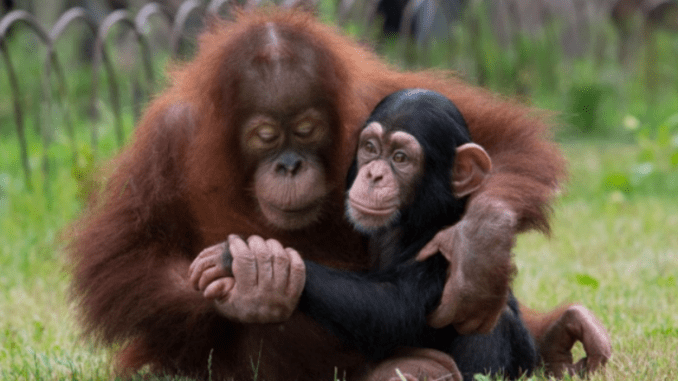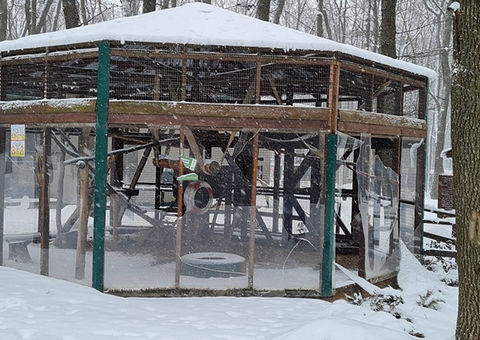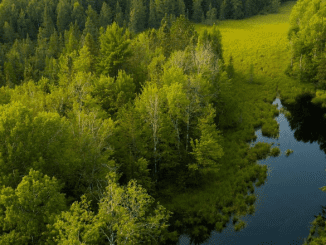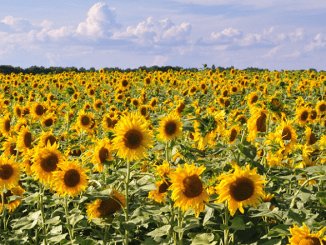
KHARKIV, Ukraine, April 27, 2022 (ENS) – The evacuation of the Oleksandr Feldman Ecopark in the bombed city of Kharkiv is still going on – the animals are being removed from the line of fire, even as shelling continues. Most lions, tigers, jaguars, leopards, bears, primates, and wolves have already been placed in safer locations.
“Feldman Ecopark is a social and humanitarian multicomplex with a large zoo exposition,” Vadym Vorotynskyi, the park’s partner project manager, told the “Kyiv Independent” newspaper, which has given permission for the republication of its original reporting in portions of this report.
Before the full-scale war about 5,000 animals of almost 300 species lived in the Feldman Ecopark, which combined animal care and therapy for children with special needs. It is a project of the ICF Oleksandr Feldman Foundation started in 1997 by Olexandr Borisovich Feldman, a member of Parliament, businessman, and multi-millionaire.
As the park is located in the northern suburbs of Kharkiv, it has been under fire since February 24. The main reason for the long evacuation is the location of the ecopark in a hot spot of hostilities. Every rescue flight could be the last.
“Almost every day its territory comes under fire from various weapons – bombs, missiles, shells, mines, large-caliber bullets,” Vorotynskyi said.

The Russian occupiers killed about 100 animals, destroyed part of the enclosures, and completely destroyed the infrastructure.
However, park staff and volunteers have supported the lives of the animals and evacuated them, despite the mortal risk.
“Almost 80 percent of the animals have already been taken to safe places. Five of our employees were killed while rescuing them,” Vorotynsky said.
Feldman, the founder of the park, said the remaining creatures may escape as their enclosures have been damaged.
“There is no more Ecopark,” he said. “I can say that the park has been almost completely destroyed.”
“Animal cages have been destroyed, all the infrastructure has been destroyed, but tigers and lions have miraculously survived.”
The temporary “zoo migrants” were mostly received by the Kharkiv Zoo and partners of the ecopark in Poltava.
Several lions and tigers went to Kyiv and Odessa, bears went to the Khmelnytsky region.
Feldman said, “The horses of our Horse Complex were taken out and sheltered by the Kharkiv stud farm. In total, we evacuated 32 horses and 21 ponies there, and we did it in time, before our stables came under heavy fire. Our horses feel good and settled down in a new place, and even a baby pony was already born!”
The rescue operation should be complete by mid-May, the remaining ecopark staff hopes.
Vorotynsky emphasizes, “We received help from thousands of people and hundreds of organizations from all over Ukraine and from around the world. They help with food, transport, accommodation of animals. Almost all zoos in Ukraine and a dozen European zoos extended a helping hand, offering to give shelter to our children. Volunteers and animal protection organizations such as UAnimals joined the rescue. We are very grateful to everyone.”
Sometimes the evacuation has to be urgently interrupted due to sudden shelling, and sometimes it is impossible to enter the territory due to fighting.
Currently, animals that have not yet been evacuated live indoors, where they are somewhat safer.
“Feldman Ecopark is very ruined, and it will take a lot of money and effort to restore it. But we will definitely cope with it and restore the ‘ecotourism pearl of Slobozhanshchyna,’ as our multi-complex was called,” Vorotynsky said.
How to help the ecopark?
The ecopark needs animal feed, gasoline and evacuation supplies. Anyone can help the ecopark by following this link.
“And, of course, we are very grateful to everyone for their support, for their attention to the fate of animals, for every kind word!” Vorotynsky sighs.
On another front, for nearly a month, the International Fund for Animal Welfare, IFAW, has managed the only animal service tent at the border crossing in Medyka, Poland. The tent, nicknamed the “Blue Tent,” is bright blue and located a few meters from where refugees, fleeing the war in Ukraine, enter Poland.
Responders, veterinarians and volunteers at the tent continue to work nonstop to help refugees and their pets. In eight to 12-hour shifts, they provide 24/7 access to pet food, triage veterinary care and animal supplies. The work is serious and at times hard, but the atmosphere in the tent and along the footpath is positive, as everyone is working together to help.
As Diane Treadwell, IFAW responder for over 10 years, says, “We’ve had varying weather conditions, but often it is cold, windy and/or rainy. We see animals come in wet and cold, so we dry them and warm them up, get them some wet pet food and water, and new carriers for the next part of their journey. It’s really great to be able to take care of these animals and to help the people of Ukraine. We just continue each day and do the best we can!”
“Our teams report seeing hundreds of refugees per day and have helped an estimated 1,400 animals at the Blue Tent since late March, Tredwell said. “Many people tell us how grateful they are to be received with such empathy and compassion.”
Featured image: Rescued from Russian bombardment of Kharkiv and destruction of the Oleksandr Feldman Ecopark, an orangutan comforts a chimpanzee in a safer location. (Photo courtesy Feldman Ecopark / Facebook)



